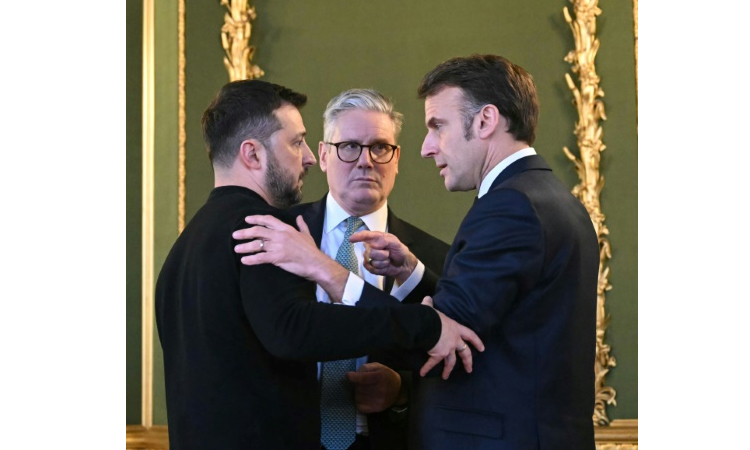News Flash
News Flash

LONDON, March 17, 2025 (BSS/AFP) - Prime Minister Keir Starmer and President
Emmanuel Macron teaming up to lead Europe's backing of Ukraine during Donald
Trump's tumultuous second presidency highlights a warming British-Franco
relationship, insiders and analysts say.
Relations between the cross-Channel neighbours nosedived during acrimonious
negotiations over Britain's departure from the European Union following a
shock 2016 referendum result.
Starmer came into office in July vowing his Labour party would "reset"
Britain's relationship with European allies, an approach he has doubled down
on since Donald Trump's White House return and subsequent upending of US
foreign policy.
"From before coming into government, Keir Starmer has prioritised building a
strong relationship with President Macron," said a Downing Street source,
speaking on condition of anonymity.
"It's clear that they have a warm personal relationship and complementary
skills. There is huge respect on both sides, which was built before the
current epochal challenge and is now invaluable."
That challenge was thrown into sharp relief last month when Trump brought
Russian leader Vladimir Putin in from the diplomatic cold by unilaterally
opening negotiations with Moscow to end its war in Ukraine.
Starmer, 62, and Macron, 47, quickly joined forces seeking to ensure that any
agreement to end the three-year conflict would respect Ukrainian and European
security -- an objective they continue to pursue together.
The pair have gathered European leaders and other allies to respective
summits in Paris and London as they attempt to assemble a "coalition of the
willing" -- countries prepared to protect any ceasefire.
Starmer and Macron say they are prepared to deploy troops to Ukraine, backed
by US support, to deter Putin from violating any truce.
They are trying to convince other nations to do the same or help through
different types of support, such as logistics and surveillance.
Starmer convened the latest meeting of interested countries on Saturday in a
virtual gathering of around 25 leaders.
The meeting came after Macron on Tuesday told military chiefs from across
Europe and beyond to move "from concept to plan" and "define credible
security guarantees" for Kyiv.
"The teams are working hand in glove," the Downing Street source told AFP.
Britain and France are acting as key intermediaries between Ukraine and
Trump's administration.
Both countries' national security advisers, along with Germany's, met a top
aide to Ukrainian President Volodymyr Zelensky in the Polish capital this
week.
Those talks came after the Ukrainian delegation returned from Saudi Arabia
where it had endorsed an American proposal for a 30-day ceasefire. The E3
national security advisers were also in Washington on Friday to meet their US
counterpart Mike Waltz.
- 'Lingering issues' -
Relations across the English channel have long been up and down.
Centuries of conflicts between the countries preceded the signing of the
"Entente Cordiale" in 1904, a series of agreements that served as a basis for
forging a closer relationship.
Elysee sources say Starmer and Macron struck up a positive relationship
immediately, which has intensified since Trump resumed the presidency.
Today's bonhomie is a far cry from 2021 when then Tory premier Boris Johnson
told Macron to "donnez-moi un break" (give me a break) and "prenez un grip"
(get a grip) over French anger about the Aukus military pact between Britain,
America and Australia.
In 2022, then candidate to be prime minister Liz Truss said "the jury's out"
when asked if she saw Macron as a friend or foe.
"The British-Franco relationship is the strongest it has been for years,"
Mujtaba Rahman, managing director for Europe at political risk consultancy
Eurasia Group, told AFP.
"Both the political principals and their principals are in constant contact.
As Europe's two pre-eminent nuclear and strategic powers, this is a very good
thing."
Despite bilateral ties being warm, tensions linger over Brexit, including
over fishing rights in UK waters. And there remains competition between the
two nations.
"(The relationship) becomes a lot more complicated in the context of the EU,"
Anand Menon, UK director of the Changing Europe think-tank told AFP.
"There are still lingering issues."
Paris remains wary of Britain's long ties to the United States, suspecting it
is too dependant on Washington, and at the end of the day could choose to put
their "special relationship" first.
Patrick Chevallereau, a former defence attache at the French embassy in
London, agrees.
"There has indeed been significant progress (but) there is still room for
improvement," he told AFP.